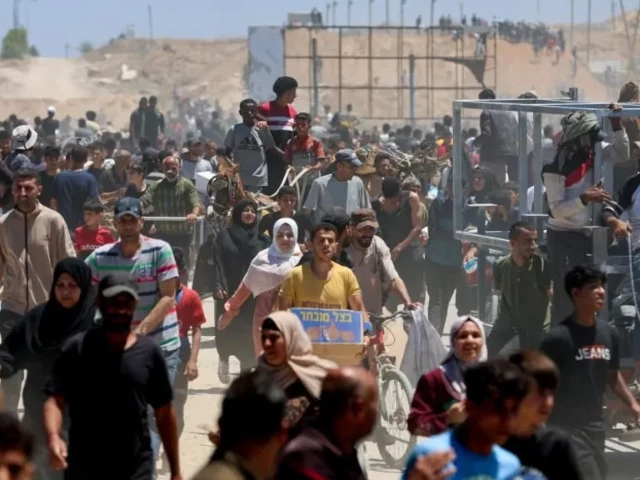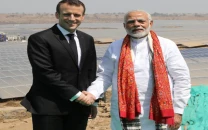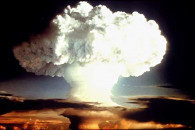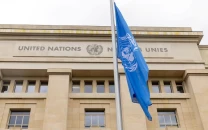UN humanitarian chief says Gaza facing forced starvation by Israel
"We would expect governments all over the world to stand for international humanitarian law" Fletcher said

A senior United Nations official has accused Israel of subjecting civilians in Gaza to forced starvation, warning the situation may constitute a war crime.
In an interview with the BBC, Tom Fletcher, the UN’s humanitarian chief, said that denying food to a starving population could not be justified. "It is classified as a war crime. Obviously, these are issues for the courts to take the judgement on, and ultimately for history to take a judgement on," he said.
Israel imposed a near-total blockade on Gaza for nearly three months before allowing limited aid last week. Since then, chaotic scenes have unfolded at distribution centres run by the Gaza Humanitarian Foundation (GHF), a US- and Israeli-backed group not supported by the UN.
The United Nations reported that 47 people were injured earlier this week during a scramble for aid at one such site.
Mr Fletcher said: "We're seeing food set on the borders and not being allowed in when there is a population on the other side of the border that is starving, and we're hearing Israeli ministers say that is to put pressure on the population of Gaza."
"We would expect governments all over the world to stand for international humanitarian law, the international community is very, very clear on that," Mr Fletcher said.
Hamas says US-brokered ceasefire plan will prolong Israeli aggression in Gaza
A ceasefire proposal put forward by the Trump administration has been met with criticism by Hamas, who say the current terms would lead only to further killing and famine in the besieged Gaza Strip.
The plan, which the United States says Israel has already accepted, remains under review by the Hamas leadership, Al Jazeera reported.
Hamas officials say the proposal lacks the core guarantees Palestinians have long demanded: a permanent halt to Israeli military operations, full withdrawal of occupation forces and unfettered humanitarian access.
“The deal does not meet any of our people’s demands, foremost among them, halting the war,” said Basem Naim, a member of Hamas’s political bureau. “Nonetheless, the movement’s leadership is studying the response with full national responsibility.”
A response is expected by the end of the week even as tensions prevail on the ground and within diplomatic channels.
A plan with conditions
According to a draft seen by Reuters, the ceasefire plan would span 60 days and include the release of 28 Israeli hostages, both alive and deceased, in exchange for 125 Palestinian prisoners and the remains of 180 Palestinians. The terms have not been revealed publicly by officials from either side.
Mediated by Egypt and Qatar, and reportedly guaranteed by President Donald Trump, the plan would allow international aid to flow into Gaza as soon as Hamas signs the agreement.
However, senior Hamas official Sami Abu Zuhri said the proposal failed to include any Israeli commitment to end the war or lift the blockade, raising serious doubts about its sincerity.
“This is just another attempt to pressure the resistance while civilians in Gaza continue to suffer,” Zuhri told Reuters.
READ: Israeli strikes kill 55 people in Gaza today
Conflicting accounts
Earlier this week, Hamas said it had reached an initial understanding with Trump’s Middle East envoy, Steve Witkoff, involving a framework for a permanent ceasefire and the establishment of a neutral administrative body to manage post-war Gaza.
Witkoff, however, denied that any such agreement had been reached, calling Hamas’s version “completely unacceptable”. A US official described the group's statement as “inaccurate and disappointing”.
Israeli officials also rejected the Hamas account, with one unnamed source quoted in local media labelling it “psychological warfare”.
Meanwhile, Israeli Prime Minister Benjamin Netanyahu has signalled a willingness to move forward with the US-backed proposal, according to reports shared with families of Israeli captives. Some analysts suggest this could be a political calculation aimed at placing the blame on Hamas if talks collapse.
“It’s not the first time Netanyahu has made a deal impossible to accept, then blamed Hamas for the failure,” Israeli analyst Akiva Eldar told Al Jazeera.
On the ground: war and hunger
The situation in Gaza remains catastrophic. Since Israel resumed its military assault on March 18 after breaking ceasefire terms and conditions, more than 4,000 Palestinians have been killed, bringing the total death toll in the enclave to over 54,000, according to Palestinian health authorities.
The blockade on humanitarian aid has pushed many areas of Gaza to the brink of famine. Though Israel partially eased its restrictions on May 19, allowing some aid to enter, United Nations Secretary-General Antonio Guterres called the relief “a teaspoon of what is needed”.
Read more: Hamas agrees to US ceasefire proposal, but Israel rejects it
This week, chaotic scenes unfolded as thousands of Palestinians swarmed limited aid deliveries distributed by the US- and Israeli-backed Gaza Humanitarian Foundation – a new and controversial initiative criticised by many in the region for lacking transparency and local coordination.
Israel's war on Gaza
Gaza's health ministry said on Sunday that at least 3,785 people had been killed in the territory since a ceasefire collapsed on March 18, taking the war's overall toll to 53,939, mostly civilians, according to AFP.
Israel's atrocities have displaced around 90% of Gaza’s estimated 2 million residents, created a severe hunger crisis, and caused widespread destruction across the territory.
The Israeli army has pursued a brutal offensive against Gaza since October 2023, killing at least 61,000 Palestinians, most of them women and children, according to Al Jazeera.
The International Criminal Court issued arrest warrants last November for Israeli Prime Minister Benjamin Netanyahu and his former Defense Minister Yoav Gallant for war crimes and crimes against humanity in Gaza.
Israel also faces a genocide case at the International Court of Justice for its war on the enclave.























COMMENTS
Comments are moderated and generally will be posted if they are on-topic and not abusive.
For more information, please see our Comments FAQ